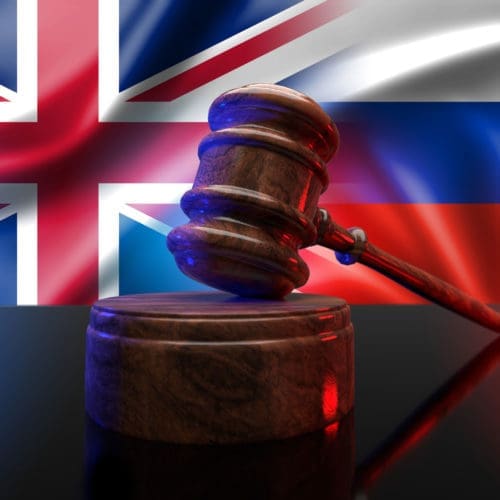“Reasonable cause to suspect” – what does it mean? Two key judgments on sanctions compliance
October 2024This summer the UK courts issued two important judgments, which provide crucial guidance for parties attempting to navigate UK sanctions regulations, particularly those linked to the *Russia (Sanctions) (EU Exit) Regulations 2019 (“Russia Regulations”). Both cases illustrate the complexities of determining when sanctions come into play, showing that the need to adjudicate such issues is sometimes unavoidable, even for parties not directly seeking to engage in business with Russia.
The key difficulty in sanctions compliance often lies in working out whether one is dealing with a sanctioned individual or entity. Pursuant to Regulation 11 of the Russia Regulations, there is a strict legal obligation to refrain from dealing where there is “reasonable cause to suspect” that there are entities or persons who have been placed on the sanctions list by the UK Government. The prohibition also attaches to entities under the ownership or control of sanctioned entities.
All of this gives rise to two key questions:
- What is meant by “reasonable cause to suspect”? In other words, at what point are there enough clues to indicate you should not deal further with someone who may be sanctioned? This question was addressed in the first case below.
- When can an entity be considered under the “ownership or control” of a sanctioned person? Specifically in the second case below, the issue arose from President Vladimir Putin being himself sanctioned. Isn’t everything in the Russian economy under his control and therefore are all Russian companies to be regarded as sanctioned?
Regulation 11 of the Russia Regulations makes it a criminal offence either to provide or deal with funds or economic resources which are owned or controlled by a sanctioned entity, or to accept funds or economic resources from such a person. Economic resources include assets – tangible or intangible – which are of value and may be exchanged to obtain goods and services.
Offences under the Russia Regulations may lead to custodial sentences for the individual perpetrators and, in some cases, the officers of companies which commit the offence. Financial penalties may also be imposed by the UK Office of Financial Sanctions Implementation (“OFSI”).
There are reporting obligations too. According to OFSI guidance: “If you know or have “reasonable cause to suspect” that you are in possession or control of, or are otherwise dealing with, the funds or economic resources of a designated person you must:
- Freeze them
- Not deal with them or make them available to, or for the benefit of, the designated person, unless there is an exception in the legislation that you can rely on or you have a licence from OFSI
- Report them to OFSI”[1]
This note covers the two judgments and sets out the lessons they provide for effective sanctions compliance.
- Vneshprombank LLC v Bedzhamov[2] – Reasonable Cause to Suspect
This judgment considered whether a particular Russian company, A1 LLC, was controlled by Designated Persons, including sanctioned individuals such as Messrs Fridman, Khan, and Kuzmichev, under UK sanctions regulations. A1 LLC was financing litigation for Vneshprombank. There was a risk of infringing Regulation 11 of the Russian Regulations if (i) it transpired those three sanctioned persons were exercising control over A1 LLC, but (ii) funds were given to or taken from that entity. There was an issue to resolve as the three controlled persons had previously owned A1 LLC but sold it on shortly before being designated.
Reviewing the case law, the Court set out the following seven points as to when a party can be said to have “reasonable cause to suspect”:
- The test imports an objective element requiring an evidential foundation[3];
- It must be fact-based and genuinely reasonable[4];
- It requires that on the available information, a reasonable person would, not might or could, suspect that in e.g., a Regulation 11 case, a person whose funds or economic resources are dealt with is a designated person within the meaning of the Regulations[5];
- The question whether there are reasonable grounds to suspect must be considered in the round, in a fair-minded review which takes into account all relevant information including undermining material. Initial suspicions may be dispelled by information or evidence which undermines what might otherwise be reasonable grounds[6];
- It is necessary to guard against making unreliable assumptions and to exercise caution when treating the complexity of corporate structures as grounds for suspicion[7];
- The accuracy and credibility of the sources of evidence relied upon should be evaluated and verified, although such evidence is not limited to that which would be admissible in court[8];
- Whether a statutory test of reasonable suspicion is met must be carefully considered and the applicant’s presentation subject to rigorous and critical analysis[9];
- Speculation as to continued control by a DP over a non-designated entity does not establish a triable case of such continuing control[10].
This eight-point summary is a helpful checklist for trying to work out if suspicions are sufficiently solid for a situation to present a compliance risk. There is often considerable uncertainty as to whether there are enough concrete indications for a company to cease acting on a particular operation or with a particular client. It is useful to read, for example, that while complex international group structures are not an automatic ground for concern, suspicious transactions (e.g. asset disposals for nominal payments) should cause alarm and be grounds for further inquiry.
The Court set out the following key points of evaluation of the facts in this case:
- Reasonable Cause to Suspect: The court’s analysis focused on whether there was a reasonable basis to suspect that these sanctioned individuals maintained control over A1 after their purported sale of interests following their designation as sanctioned persons. The court carefully examined the timing of the sale (which occurred shortly after their designation) and the fact that the transaction was made for a nominal value (£714), casting doubt on its legitimacy. The suspicion was heightened by A1’s opaque financial records, which omitted key assets from its balance sheet (paras 91-98).
- As noted above, the court clarified that “reasonable cause to suspect” did not require definitive proof of control but rested on whether the available evidence reasonably raised concerns about the connection between sanctioned individuals and the relevant entities. For practitioners, this means that even indirect evidence—such as unclear financial disclosures or unusual timing of transactions—can trigger obligations to investigate potential sanctions breaches.
- Threshold for Suspicion: The judgment also set a practical threshold for what constitutes reasonable cause for suspicion. It confirmed that this threshold could be met by red flags like insufficient documentation or transactions that appear to lack commercial rationale, without needing hard proof of ongoing control by sanctioned individuals. The Court also noted that the acquirer was not a neutral third party but a long-time former employee of the designated persons.
- Timing of Transactions: The judgment underscores that the timing of key business decisions, such as a sale occurring immediately after the imposition of sanctions, can be a critical factor in assessing whether the sale was an arms-length transaction or potentially a strategy to circumvent sanctions.
- Conclusion: Taking all factors together, the court concluded that the “reasonable cause to suspect” test was met on the facts of this case. This was not a situation where there is one query or area where suspicions arise. There were multiple overlapping indications which suggested that the sale of A1 LLC by the sanctioned parties had not been an arm’s length transaction.
By fleshing out what it means to have “reasonable cause to suspect,” the Vneshprombank decision provides a helpful guide for legal practitioners advising clients on the risks of interacting with entities connected to sanctioned persons, even if those entities do not appear to be under direct ownership or control.
- Hellard & Ors v OJSC Rossiysky Kredit Bank & Ors (Rev1) [2024] EWHC 1783 (Ch) (10 July 2024)[11] – Control by a Designated Person
In Hellard, the court dealt with whether certain Russian bank creditors involved in the bankruptcy of Anatoly Motylev, a Russian national, could be regarded as under the control of a DP, specifically Russian President Vladimir Putin or Governor Elvira Nabiullina of the Russian Central Bank.
The action was brought by the trustee in bankruptcy of Mr Molytev who sought directions from the Court on this question under the Insolvency Act 1986 as the trustee was concerned to ensure compliance with the Russia Regulations.
The concern was whether allowing these creditors to prove their debts in the bankruptcy would breach sanctions regulations.
Key points in the judgment were as follows:
Direct vs. Indirect Control: The trustees sought guidance on whether the Russian banks (which were in liquidation) were controlled by a DP, given the state’s significant influence over the liquidation process in Russia. While the Russian government had influence over the insolvency practitioners (through the Deposit Insurance Agency, or DIA), the court found no direct evidence that the state, or any DP, actively controlled the banks’ actions in the insolvency process (paras 120-123).
The court distinguished this case from previous rulings, particularly Mints[12], where the Russian banks in question were 99% owned by the Russian Central Bank, which was directly controlled by the Russian government. In *Hellard*, while the Russian state had a supervisory role over the liquidators, there was no evidence of de jure or de facto control over the banks’ day-to-day affairs (paras 97-123).
- Degrees of Control: The judgment carefully delineates different types of control.
- De jure control exists when a DP has a legal right to control the entity’s decisions (e.g., through majority ownership or voting rights).
- De facto control involves actual, practical control over decision-making, even without legal authority.
- Potential future control refers to situations where a DP could theoretically exert control in the future but hasn’t done so yet.
The court found that while the Russian state had potential influence, this was insufficient to meet the threshold of control under the sanctions regulations, especially given the lack of direct evidence showing actual control (paras 76-78, 98-122).
- Guidance from OFSI: OFSI’s position in the case was notable, as the agency declined to offer a definitive view on whether the banks were under the control of a DP. The court’s conclusion, however, aligned with OFSI’s general guidance that theoretical or potential control by a DP is not enough to trigger sanctions restrictions. The court emphasized that actual evidence of control is necessary, a position that mirrors OFSI’s broader approach to enforcement (paras 118-127).
- Creditor Voting Rights: A significant issue in Hellard was whether the voting rights of the Russian banks in the bankruptcy could be considered “economic resources” under the sanctions regulations. The court determined that creditor voting rights do not constitute economic resources because they are not inherently valuable and cannot be used to obtain goods or services (paras 140-150). This was a key clarification, ensuring that creditors’ participation in the bankruptcy process would not breach sanctions, unless the funds distributed in the process went directly to a DP.
- Practical Implications: The court’s directive that the trustees should continue enhanced monitoring and due diligence on the Russian bank creditors (paras 205-206) reinforces the practical need for vigilance in insolvency cases involving entities connected to sanctioned states, even where no direct evidence of control exists.
Conclusion and Future Implications
These judgments are critical for parties seeking to comply with UK sanctions regulations, providing clarity on two important concepts: *”reasonable cause to suspect”* and *”control by a Designated Person”*. They illustrate that sanctions-related risks may arise even when parties are not directly engaging in business with sanctioned entities, and sometimes, careful adjudication is necessary to determine whether sanctions apply.
The Vneshprombank summary of the “reasonable cause to suspect” concept is, as stated above, very useful. This effectively guides businesses to take a common-sense approach. They need to stop acting where a reasonable person would – not “could” conclude the counterpart was a sanctioned person. This is more helpful than, say, the Court’s dicta in Campbell, where HHJ Hodge said elusively “reasonable cause to suspect” is a lower threshold than knowledge, or even belief.”[13] It is also an improvement on OFSI guidelines which stated this is “an objective test that asks whether there were factual circumstances from which an honest and reasonable person should have inferred knowledge or formed the suspicion”[14]. This is a good starting point but very limited and devoid of practical examples to assist businesses understand the extent of their obligations and when they risk liability from an operation or transaction.
Meanwhile, Hellard provides guidance on what constitutes control under the sanctions regime, emphasising the need for actual evidence of interference or control, rather than theoretical influence from powerful (but distant) state authorities. However, it is essential to remember that Hellard is not a Court of Appeal judgment, and the court’s distinction of earlier decisions, such as Mints, could be challenged in future cases. The court’s decision, supported by the reasoning in the earlier Litasco case, is submitted to be the correct one, but legal practitioners should keep a close eye on developments in this area of law.
In summary, both cases underline the importance of thorough due diligence, vigilance, and the need for parties to remain alert to evolving sanctions risks. However, they also counsel against rushing to conclusions either way on a transaction until proper, dispassionate and diligent inquiries and consideration of all available evidence has been taken into consideration.
[1] UK financial sanctions general guidance, updated 16 May 2024 at para 3.1.2.
[2] [2024] EWHC 1048. Judgment of Mrs Justice Cockerill dated 3 May 2024.
[3] R v Lane and Letts [2018] UKSC 36 at [22] and [24], identifying the objective nature of the standard in the context of the terrorist financing offence in s.17 of the Terrorism Act 2000
[4] R (Ahmed) v HM Treasury [2009] 3 WLR 25, [135] (Sedley LJ)
[5] R v Lane and Letts [24]; R (Ahmed) v HM Treasury [136] where Sedley LJ described the ‘may be’ test as “on any rational view, a bridge too far”
[6] National Crime Agency v Baker & Ors [2020] EWHC 822 (Admin) (Lang J)
[7] NCA v Baker [95]-[100]
[8] . LLC Synesis v Secretary of State for Foreign, Commonwealth and Development Affairs [2023] EWHC 541 (Admin) (Jay J) at [73] “the Court will normally expect that at least some recognition has been given to its inherent quality”
[9] R (Rawlinson & Hunter Trustees) v Central Criminal Court; R (Tchenguiz & Or) v Director of the Serious Fraud Office [2013] 1 WLR 1634, [89]
[10] . Litasco SA v Der Mond Oil and Gas [2023] EWHC 2866 (Comm) [63]-[64]
[11] [2024] EWHC 1783 Judgment of Deputy Judge Nicholas Thompsell dated 10 July 2024
[12] Mints & Ors v PJSC National Bank Trust & Anor [2023] EWCA Civ 1132 (06 October 2023)
[13] Campbell v Tyrrell [2022] EWHC 423. This was a case about the Consumer Credit Act 1974 in which the High Court needed to determine whether there had been reasonable cause to suspect an agreement had not been entered into for business pusposes.
[14] UK financial sanctions general guidance, updated 16 May 2024 at para 3.1.2.
Download PDF







